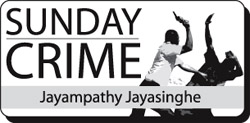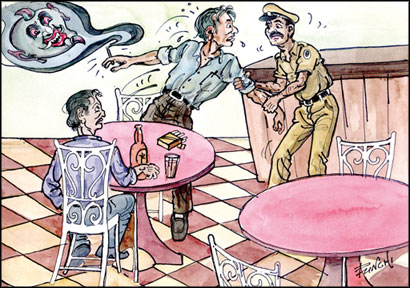Law strengthened to curb smoking in public places
 The effort to circumvent the law by manufacturers of beedi producers
has been thwarted following the decision of the Court of Appeal
recently. Although white Beedi manufacturers argued that their product
does not fall within the ambit of law under the Tobacco Tax Act No 8 of
1999 and Tobacco Tax (Amendment) Act No 9 of 2004, Courts have held that
all Beedi production was governed by law. The effort to circumvent the law by manufacturers of beedi producers
has been thwarted following the decision of the Court of Appeal
recently. Although white Beedi manufacturers argued that their product
does not fall within the ambit of law under the Tobacco Tax Act No 8 of
1999 and Tobacco Tax (Amendment) Act No 9 of 2004, Courts have held that
all Beedi production was governed by law.
At a discussion held recently on the developments of law relating to
the tobacco industry, Attorney-at-Law Kalinga Indatissa disclosed that
the knowledge on law relating to the Tobacco Act and its amendments have
not been thoroughly understood by the public as well as the media that
created problems.
Referring to laws that are currently in operation he said they were
designed by the British during their reign.
Britishers
 “The thinking behind the laws were the thinking of the Britishers
then. But times and systems have changed and the laws need to be amended
to suit the present day society.” “The thinking behind the laws were the thinking of the Britishers
then. But times and systems have changed and the laws need to be amended
to suit the present day society.”
Attorney Indatissa, further said that the Tobacco industry was
regulated until 2007 by statutes such as the Excise Ordinance, Tobacco
Tax Act of 1999, and the Tobacco Tax Amendment Act of 2004.
A problem arose in later years with regard to the sale of tobacco
products to young people below a certain age group. “Although this
wasn’t a problem in Sri Lanka, it was a problem in other parts of the
world.
The second problem was smoking in public places.
The above matters ultimately led to the foundation of the Tobacco Tax
Act No 8 of 1999 and Tobacco Tax (amendment) Act No 9 of 2004.” he said.
In early 2000 Sri Lanka became the first country in South East Asia to
become a signatory and ratify WHO convention on the use of tobacco.
Excise Ordinance
He said the Excise Ordinance, the Tobacco Tax Act No 8 of 1999 and
the Tobacco Tax (Amendment) Act No 9 of 2004 collectively impose
restrictions on the tobacco and the alcohol industry.
For instance cigarettes, cigars, beedi, and pipe tobacco have been
regulated by the passing of amendments.
The intention of the legislature was to have control over them.
However, where beedi was concerned it was defined under the Tobacco
Tax Act No 8 of 1999. Beedi has been defined as tobacco specially grown
for the manufacture of beedi whether cut, crushed, broken or powdered
(1) rolled in a leaf of the tropical tree botanically known as Diospyros
melanoxylon or Diospyros abinum of the family of Ebenaneae or the family
of Ebenneae or any of its substitutes and (2) intended for smoking. The
wrapper too has to be from a tobacco leaf in terms of the definition.
However, controversy arose when the white beedi manufacturers took up
the position that their product did not fall under the Tobacco Tax No 8
of 1999 and Tobacco Tax (Amendment) Act No 9 of 2004.
To circumvent the law, the white beedi manufacturers wrapped up their
beedi with paper instead of tobacco leaf and claimed immunity in court
that unlike cigarettes, cigars, and pipe tobacco and beedi, their
product could not be regulated as they do not fall within the ambit of
beedi as defined in the Tobacco Tax No 8 of 1999.
According to Attorney, Kalinga Indatissa their argument was found
erroneous by a recent Court of Appeal judgement. The Court held that
products not defined as cigarettes, cigars, beedi, or pipe tobacco under
the Tobacco Tax No 8 of 1999, were also considered as cigarettes.
Initially the Court of Appeal issued a stay order restraining the police
from taking action against the white beedi manufacturers or
investigating them.
At this juncture the Udawatte Nanda Thera and Attorney-at-Law Rakitha
Abeygunawardena intervened and challenged the position in the Court of
Appeal. Consequently the Court of Appeal removed the stay order.
Attorney-at-Law Indatissa said although the Tobacco Company officials
were invited to air their views at the round table discussion they were
not present on the occasion.
“They could have also made a contribution on this subject. Our
position on this subject was a simple one.
Institutions
We want to tell the people and institutions the law would apply
equally.”
He said as lobbyists they have no objections whatsoever to laws
promulgated in respect of tobacco and alcohol industry, drafted in
consultation with producers. “In any civilised society that form of
control and restriction was necessary,” he said. Referring to white
beedi he said that it was also a tobacco product.
The white beedi after all was not used for any other purpose other
than smoking. “We urge authorities concerned to enforce the law.”
Udawatte Nanda Thera said almost 2300 years ago the majority of the
people in the country were Sinhala Buddhists up to 1505. Following
successive foreign invasions the country was ruled according to their
wishes.
Ancestors
“Although our ancestors were not addicted to liquor they may have
consumed it in accordance with their health status. However people
became addicted to liquor after foreign conquest.” He said prior to the
enforcement of the Tobacco Tax Act, people smoked in public places, such
as in offices, in buses, in hotels without paying attention to their
health.
Some considered smoking and drinking as a symbol of status. “There
have been instances when fathers smoked cigarettes while carrying
children in their arms without thinking of the health hazards. There
were people who smoked in public places such as hotels without
considering the ill effects of smoking on women and children.
“Smoking in public places and the sale of cigarettes to under-aged
persons have been reduced drastically following the enactment of the
Tobacco Tax Act and its amendments.”
The thera pointed out that some parents send children to fetch
cigarettes from the boutique. When that happens children become curious
and want to smoke on the sly. However following the enactments, vendors
too stopped selling cigarettes to minors.
Attorney-at-Law Rasika Abeygunewardena referring to the manufacture
of white beedi said there was standardisation procedure involved unlike
in the manufacture of cigarettes.
Law enforcement authorities can now enforce the law following the
decision of the Court of Appeal. |

